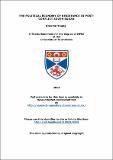The political economy of resistance in post-conflict South Sudan
Abstract
Despite recent scholarly attention, the phenomenon of resistance in post-conflict
environments remains largely under-conceptualized. This represents a major shortcoming in the theory and praxis of post-conflict peacebuilding and development. Seeking to address this problem, this study explores how, why and by whom the economic dimensions of contemporary peacebuilding and development projects are contested in their local applications, using South Sudan as a case study. A theoretical framework for analysing resistance is proposed and subsequently employed to provide insights into activities that are cast as informal, illicit or illegitimate by dominant neoliberal orthodoxy. This is done in
three distinct yet overlapping ways. First, the role that informal economic activity plays in the political economy of post-conflict South Sudan is examined. Informal economic activity is conceptualized as a form of resistance to the failings of the formal sphere, but also as a form of power where agency is absent and that is encouraged as a type of local neoliberalism. Second, the legitimate/illegitimate and licit/illicit dichotomies that define
economic activity in post-conflict South Sudan are problematized through an exploration of current debates surrounding corruption and land tenure. These debates demonstrate how neoliberal economic orthodoxy breaks down and becomes redefined in its local contacts. Finally, the centre/periphery dynamics that define the political economy of South Sudan’s
borderlands are conceptualized in terms of power and resistance, and resistance is shown to be fundamentally tied to power in ways that are characterized by subjectivity and hybridity. Resistance plays an important role in post-conflict environments. Addressing its economic dimensions must be a central task of contemporary peacebuilding and development projects.
Type
Thesis, MPhil Master of Philosophy
Items in the St Andrews Research Repository are protected by copyright, with all rights reserved, unless otherwise indicated.

